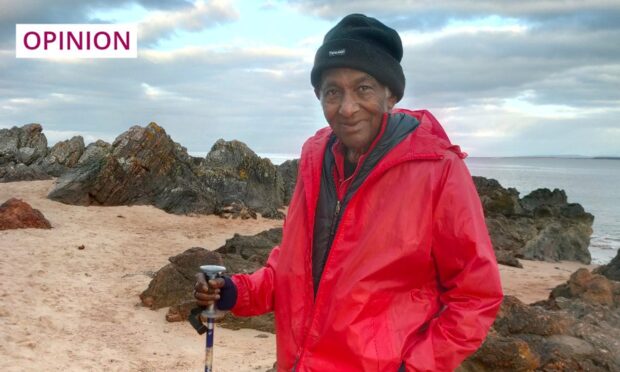This summer, I lost my father. He was a carer in the Highlands, whose own health plummeted after the loss of my mother.
The harder thing to discuss is that he might well have lived for longer had he sought and accepted medical health checks. His mental health was poor at times and, due to a lack of diagnosis, he was unaware of the impact this had. His mental ill-health led directly to his neglect of his physical health.
As his daughter, I saw the decline, but was powerless to get through to him. I lived at a distance, but visited often and called him daily. I was also in touch with statutory services, but their hands and mine were tied, because he was never a danger to others and there was no obvious immediate danger to himself – although I now find myself wondering where that line lies.
It was upsetting to be told along the way that I didn’t count as a carer if I didn’t physically visit each week, because the costs to my own wellbeing were significant.
I was part of the “sandwich generation”, looking after parents and young children whilst holding down a job. I wanted to preserve my dad’s dignity whilst trying my best to do the right thing – and will probably always wrestle with whether I got it right. With long-standing taboos around mental health in the family, I kept a lot hidden, but it is time to speak out.
My dad was an immigrant: Asian with very dark skin. He arrived here in the 1960s, in his 20s, and experienced sustained and systematic racism. He left work to care for my white mother after my birth and later found it impossible to get back on the career ladder. From having a prestigious job, he found only doors slamming in his face and it ate away his self-esteem.
I have early memories of racist taunts, and a sense that we were never guaranteed peace when we were out. When you never knew when the next threat might come out of the blue, you developed hypervigilance and anxiety.
The cost of keeping our feelings hidden was never discussed
My father did what many people of colour describe and worked hard to be likeable – in his case, to develop a cheery persona. While there was nothing inherently wrong with this, it was a single story that masked his depth of experience.
He told me that racism grew out of fear, and that I should attempt to understand the people who questioned my right to exist. Success was keeping our feelings hidden, normalising these experiences. The cost was never discussed, but there were flash points of his rage, mostly at home – trauma that could not be bottled and held within.
Once, my dad was forcefully and wrongfully stopped by a security guard. His reactive punch led to his entry into the court system. Thankfully, his white friends were able to vouch for his character, leading to the case eventually being dismissed.
I discussed my childhood with friends of colour, and saw patterns emerging. Parents who were arrested, sometimes due to reacting to racism, sometimes due to a less than compassionate response by the police to situations caused by significant mental health issues. Disturbingly, I hear similar accounts concerning people of colour younger than myself.
Last year, I took the Scottish Mental Health First Aid training course. One bullet point stated that people of colour were more likely to suffer mental health issues, but gave no context. The research shows that this higher incidence is not the case in countries with a majority black or brown population.
The problem is the effects of experiencing discrimination, alongside barriers to getting support. At his worst, my father had paranoid tendencies. I wonder, though, whether it is purely paranoia if it is built on a lifetime of facing racist microaggressions.
Exposure to racism impacts health
We have moved on from the 1980s, but health disparities are well documented; certain ethnic minority groups on average get multiple long-term health conditions 10 to 15 years earlier than the least deprived communities. There is research evidence suggesting that a lifetime of exposure to racism leads to premature aging, disease and much earlier mortality.
My friends of colour and I can still quote far too many instances where we have experienced racism. The normalisation of the dehumanising language used to describe migrants is highly concerning, and took centre stage at the recent Conservative Party conference.
Racism is not an issue that lies in the past or is confined to those who march under the Nazi flag
I hope for a society that is better educated about the statistics, and the stories that lie behind them. Racism is not an issue that lies in the past or is confined to those who march under the Nazi flag. We have to examine our assumptions, and enhance our education; check that we are not othering people and excluding them from full participation in society.
I miss my dad, and nothing will bring him back, but I hope that by sharing his story I can help bring this issue out from behind closed doors.
Anita Mackenzie is a poet, actor, musician and a lecturer at UHI Perth
- This article is part of a partnership with Pass the Mic, a project focused on increasing representation of women of colour in Scottish media

Conversation